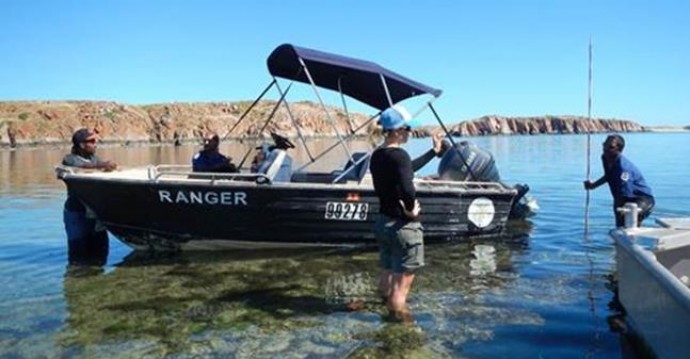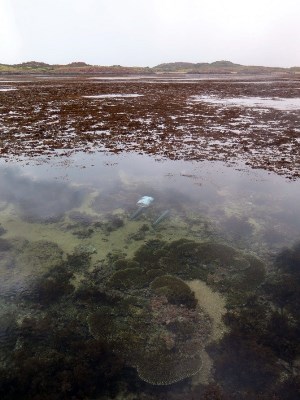Indigenous partnerships in marine science
Below is a case study, but if you are interested in partnering with a management, science, community or university partner, please see 'A guide to Indigenous science, management and governance of Australian coastal waters' and click on the “Promoting Partnerships” at top of page.
Following the reefs newest recruits
With the help of the Bardi-Jawi Marine Ranger group and Traditional Owners (TO’s) of the Bardi and Jawi people, the Australian Institute of Marine Science (AIMS) is leading a research project into fish and coral recruitment processes in the Kimberley. Fish and coral recruitment processes are critical to marine ecosystem health because they underlie the replenishment of key marine communities. Until recently, we had little to no understanding of how these processes work in the Kimberley region and could only speculate on how the challenging macrotidal environment of the Kimberley might complicate them (up to 10m tidal range). On top of this, the Kimberley marine environment is vastly different to those AIMS usually works in because they are comprised of a mosaic of different habitat types from inter-tidal pools to mangroves, seagrass and algal meadows as well as coral reefs.
Indigenous protected area management
AIMS staff have been working with the Bardi-Jawi Marine Ranger group through the Western Australian Marine Science Program (WAMSI) since the inception of this research program in 2013. Particular attention was paid in the initial stages to closely align AIMS’ research questions with goals outlined in the Bardi-Jawi Indigenous Protected Area Management Plan 2013-2023 for fish and corals. A number of consultations with the Rangers and TO’s in 2013-2014 helped refine the research questions to specifically target monitoring the health of these communities and providing the type of science that helps the Rangers make informed management decisions.
Sharing knowledge and understanding
The Rangers and TO’s have an astounding and intimate knowledge of their Sea Country and were instrumental in locating key habitats and sites for AIMS researchers. Their skills in navigating the enormous tides and complex island geography of the area have also been important. In return, AIMS and its WAMSI collaborators share and discuss their findings, explain how we progress from primary objectives to knowledge suitable for management, present to the local community and invite them to collaboratively participate in the work. Rangers are doing monthly swap outs of coral recruitment tiles and helping with fieldwork tasks such as catching juvenile fish, deploying and retrieving underwater video cameras. Overall, it has been a very positive experience for all. Friends and contacts have been made in this special area of the world and we all have a better understanding of not only Bardi-Jawi Sea Country but also each other.
The AIMS-led WAMSI program is a collaboration with Western Australian government and non-government organisations, including the WA Museum, Department of Fisheries, Department of Parks and Wildlife, CSIRO and UWA, and supported by the Traditional Owners of the Kimberley.






